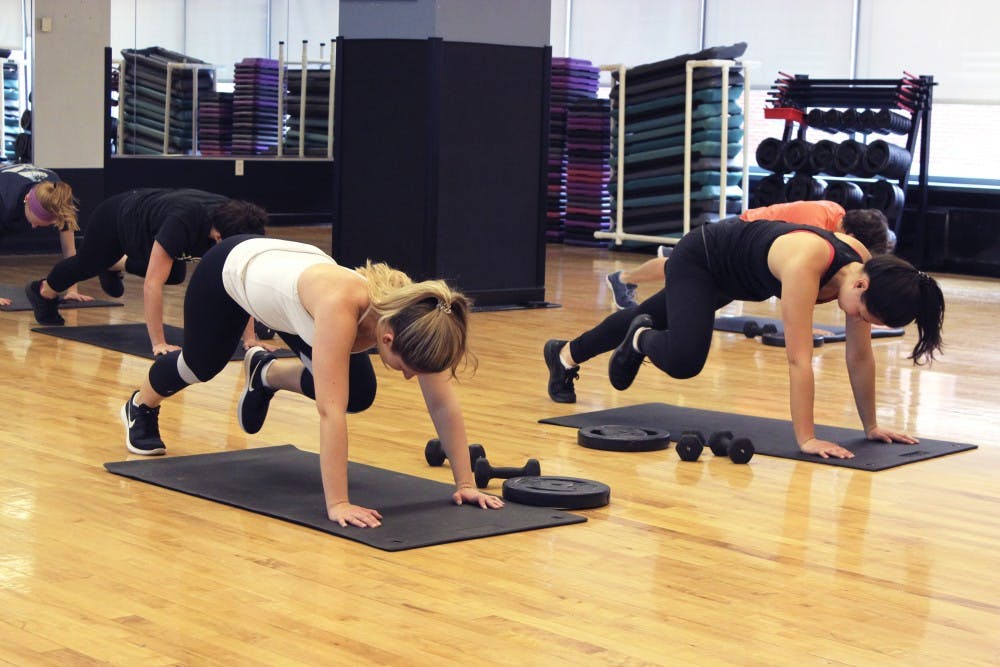Whether you’re motivated by the extra free time, the sunny weather, or the desire for good beach pics, summer is a great time to be active. But how can you start if you don’t have much—or any—experience with fitness?
In 2018, the Centers for Disease Control and Prevention found that “only 23 percent of Americans are meeting the federal standards set in 2008 for time spent exercising,” which the government defines as at least 2.5 hours of moderate aerobic activity every week in addition to some strength-training twice a week.
Most people aren’t getting enough exercise for a multitude of reasons—and as college students with classes, jobs, and social lives, it can be easy to shrug it off. We’re young and pretty much healthy, right? But getting four hours of sleep a night, studying in Van Pelt for eight hours straight, and downing beers and pizza on the weekends probably isn’t good for our bodies. Exercise is a great (and necessary) way to keep healthy, try new things, and increase confidence. Here are a few tips for getting started from absolute zero:
Getting fit doesn’t have to mean hitting the gym.
There’s a misconception that the only people welcome at the gym are basically bodybuilders. Even though that’s not true, a lot of people still have trouble getting started at the gym because of embarrassment. We’ve written an article on people feeling the same kind of intimidation at Pottruck.
Going to the gym to run or lift weights is a perfectly fine way to get into shape, but it doesn’t have to be the only way. If you’re a little insecure, unsure of how to exercise by yourself, or just find the gym boring, there are tons of other active options out there. Hiking, swimming, biking or other outdoor activities can be just as rigorous and even more fun, especially in the summer. There are also tons of fitness studios around Philly that offer deals for newcomers, allowing people to try cycling, yoga, and even boxing in a more structured, intimate setting than the gym.
Baby steps are better than huge leaps.
We’ve all felt it. The huge burst of inspiration to work out that strikes us on days like New Year’s Eve, when we decide this is going to be the time we get our shit together. And then we vastly overshoot it. We tell ourselves that by next year, we’re going to get a six–pack, run a marathon, and drop 20 pounds—all at the same time. After a few days or weeks without seeing progress, we give up.
Overshooting is a common reason why people fail their New Year’s resolutions, and it’s not an effective way to make fitness a habit. Exercise is much more likely to stick when people make small, concrete changes in their lifestyles as opposed to impossible leaps. Start by taking 10–minute walks after study sessions, jogging on the weekends, or even getting your heart rate up by doing chores. Small amounts of exercise still have health benefits, and it’s leaps and bounds above doing nothing at all.
Exercise goes well with family/friend activities.
You don’t have to do it alone! It’s much less intimidating to go to the gym or a fitness class for the first time if you’re with someone you know. Don’t hesitate to try out soccer with a friend or plan your next family outing around the outdoors. The time will pass by more quickly, you’ll get to hang out with someone you (hopefully) like, and chances are, you’ll work out harder because of the competition. You might even inspire someone to become your permanent gym buddy.
Some people find comfort in exercising with another beginner, but it can also be helpful to have a friend who’s more experienced show you the ropes. That’s preference, but either way, there are tangible benefits to having a fitness partner.
Having a good reason strengthens your resolve.
Why do you want to get fit? Because you want to look better or feel stronger? Because you want to be able to run a 5K or lift a certain amount of weights? Do you feel pressured by others to work out?
Some motivations for exercise are more effective than others. It’s important to be specific in your goals and narrow down what exactly you want to accomplish. Running 2 miles a day for a month will stick more than just “run more” or “run faster.” And exercising because you truly believe in its physical and mental benefits will stick more than the feeling that it’s something you just have to do.
Regardless of your reasons, deciding to commit to fitness for the first time is extremely admirable.

